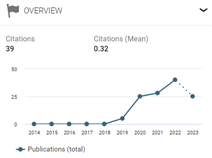Penyuluhan garam beryodium terhadap perubahan pengetahuan ibu rumah tangga dalam penggunaan garam yodium
DOI: 10.30867/gikes.v2i2.490Abstract
Background: Disorders Due to Iodine Deficiency (IDD) is one of the main nutritional problems that cannot be eliminated due to an environment that is poor in iodine sources. Residents who live in areas with an iodine deficit and only consume available food and drink. Lack of knowledge about the causes of IDD is the driving force for the high incidence of health problems.
Objectives: This study aims to determine whether there is an effect before and after the counseling is carried out on changes in the knowledge of housewives and the use of iodized salt.
Methods: This type of research is a quasi-experimental research with pre-test and post-test. This research was conducted in Trienggadeng District, Pidie Jaya Regency, which was conducted in 2019. The sample size in this study was the entire population as a sample, namely all 39 housewives. Data collection includes primary data and maternal data. Data processing in this study with 4 stages, including stages namely; editing, coding, entry, processing, and cleaning data. Data analysis was carried out univariate and bivariate. The statistical test for bivariate analysis was using the T-dependent statistical test.
Results: The results showed that the level of knowledge and use of iodized salt in housewives in Trienggadeng District, Pidie Jaya Regency. There is an effect of counseling the benefits of iodized salt before and after on increasing the knowledge of housewives, with a value of p = 0.001 (p < 0.05). There is an effect of counseling the benefits of iodized salt between before and after the use of iodized salt to housewives, with a value of p = 0.000 (p < 0.05).
Conclusion: There is the influence of education on the benefits of iodized salt to increase knowledge of housewives, but it is also significant in household use.
Keywords
Full Text:
PDFReferences
Akhiruddin, M. (2011). Analisis Kadar kalium Iodat (KIO3) Dalam Garam Dapur Dengan Menggunakan Metode Iodometri Yang Beredar Di Pasar Ujung Batu Kabupaten Rokan Hulu. In Universitas Islam Negeri Sultan Syarif Kasim Riau. Universitas Islam Negeri Sultan Syarif Kasim Riau.
Al Rahmad, A. H. (2019). Pengaruh Penyuluhan 1000 Hari Pertama Kehidupan (HPK) pada Pasangan Usia Subur di Perkotaan dan Perdesaan. Jurnal Kesehatan, 10(1), 147. https://doi.org/10.26630/jk.v10i1.1217
Balitbangkes. (2018). Laporan Nasional Riskesdas Tahun 2018.
Dinkes Aceh. (2018). Profil Kesehatan Aceh Tahun 2017.
Dinkes Pidie Jaya. (2018). Laporan Profil Kesehatan Pidie Jaya.
Erawati, N. K. (2020). Literatur review: Program mother smart grounding (MSG) dalam penanganan gizi stunting. Jurnal Kesehatan Dr. Soebandi, 8(1), 10–17.
Fitri, Y., Al Rahmad, A. H., Suryana, S., & Nurbaiti, N. (2020). Pengaruh penyuluhan gizi tentang jajanan tradisional terhadap peningkatan pengetahuan dan perilaku jajan anak sekolah. AcTion: Aceh Nutrition Journal, 5(1), 13–18. https://doi.org/http://dx.doi.org/10.30867/action.v5i1.186
Ibrahim, I. A., Raodhah, S., Syarfaini, S., & Syahraini, S. (2018). Faktor-Faktor yang Berhubungan Dengan Pemanfaatan Garam Beryodium Ibu Rumah Tangga di Kelurahan Pallengu Kabupaten Jeneponto. Al-Sihah: The Public Health Science Journal, 10(1), 26–36.
Jaya, I. K. S., & Pauzi, I. (2018). Administration of Iodized Salt, Counseling about Food Sources of Iodine and Goitrogenic, to Mothers who have Children in Primary School, Affect the Excretion of Urine Iodine. Health Notions, 2(10), 1095–1097.
Mardeilita, S. (2019). Perilaku pemeliharaan kesehatan gigi remaja di Sekolah Menengah Pertama Negeri 4 Kota Banda Aceh. Jurnal SAGO Gizi Dan Kesehatan, 1(1), 45–53.
Miko, A. (2019). Peningkatan pengetahuan, sikap, dan tindakan ibu tentang kandungan iodium dalam garam konsumsi rumah tangga pada daerah pesisir dan pegunungan. AcTion: Aceh Nutrition Journal, 4(2), 99–110.
Miko, A. (2020). Pentingnya penggunaan garam yodium untuk mengatasi anak pendek. Jurnal SAGO Gizi Dan Kesehatan, 1(2), 139–145.
Notoatmodjo, S. (2012). Promosi Kesehatan dan Perilaku Kesehatan. Rineka Cipta.
Pattola, P., Nur, A., Atmadja, T. F. A.-G., Yunianto, A. E., Rasmaniar, R., Marzuki, I., Unsunnidhal, L., Siregar, D., Puspita, R., & Pakpahan, M. (2020). Gizi Kesehatan dan Penyakit. Yayasan Kita Menulis.
Pautina, A. R. (2018). Aplikasi Teori Gestalt dalam Mengatasi Kesulitan Belajar Pada Anak. Tadbir: Jurnal Manajemen Pendidikan Islam, 6(1), 14–28.
Rahmad, A. H. Al, & Almunadia, A. (2017). Pemanfaatan media flipchart dalam meningkatkan pengetahuan ibu tentang konsumsi sayur dan buah. Jurnal Kedokteran Syiah Kuala, 17(3), 140–146. https://doi.org/10.24815/jks.v17i3.9062
Ridwan, A. (2020). Pengetahuan keluarga tentang garam beryodium pada rumah tangga di Kota Banda Aceh. Idea Nursing Journal, 11(2), 7–11.
Sudargo, T., Kusmayanti, N. A., & Hidayati, N. L. (2018). Defisiensi Yodium, Zat Besi, dan Kecerdasan. UGM PRESS.
Utaminingtyas, F., & Lestari, R. M. (2020). Pengaruh penyuluhan gizi seimbang balita dengan media leaflet terhadap pengetahuan ibu. Jurnal Ilmiah Kesehatan Ar-Rum Salatiga, 5(1), 39–47.
WHO. (2014). WHA global nutrition targets 2025: Stunting policy brief. In WHO/NMH/NHD/14.3: Vol. 14.3 (Issue WHO/NMH/NHD/14.3, pp. 1–10).
Wijawati, A., & Asiarini, W. D. (2017). Pengaruh Wadah, Kondisi, dan Cara Penyimpanan terhadap Perubahan Kadar Iodium dalam Garam. Jurnal Ilmu Kesehatan, 9(1), 7–14.
Refbacks
- There are currently no refbacks.













